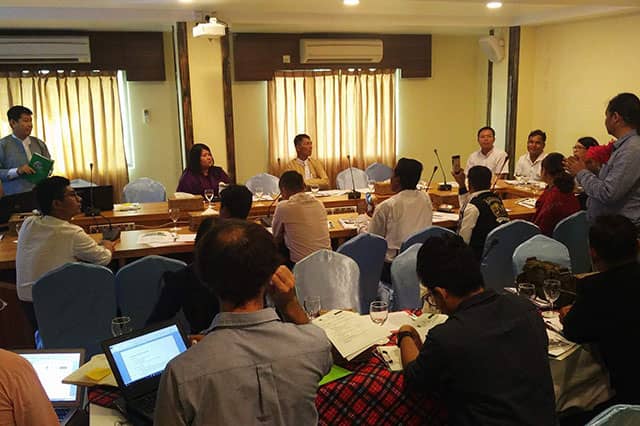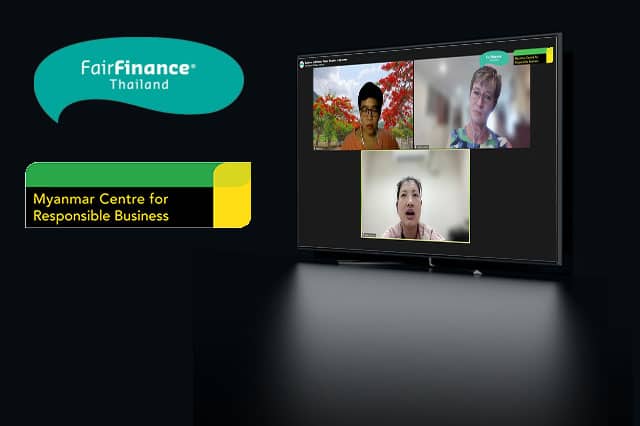Civil Society Organisations Stress the Need for More Information in the EIA Process

MCRB and Vermont Law School (VLS) held a Workshop on EIA for CSOs in Yangon on 8 December, attended by 25 participants, including representatives from CSOs from Rakhine, Shan, Mandalay, Mon, Sagaing, Kayah, Karen, Kachin, and Magway, as well as U Tin Min Htoo, Assistant Director with the EIA Division of Environmental Conservation Department (ECD) of the Ministry of Natural Resources and Environmental Conservation (MONREC).
The objectives of the workshop were:
-
To review the first two years of EIA Procedure, lessons learned and feedback from civil society organizations for future improvement.
-
To discuss how regulators, private sector, and civil society can increase cooperation to strengthen the implementation of Myanmar’s EIA system, in particular with regards to:
-
Public participation in the EIA process
-
Public disclosure of environmental information
-
EIA for projects impacting indigenous peoples and ethnic minorities
-
ECD presented on ECD’s organizational structure, the EIA procedure, and their processes for reviewing EIAs and what they look for in the reports. This included an overview of the EIA Review Committee, which currently consists of 39 members, 20 of which are from MONREC and 19 of which represent other Ministries, and answered questions from participants. This included how communities should file complaints regarding projects that have begun construction before receiving their EIA approvals, or that have simply not engaged in the EIA process. Another participant asked how communities can get more involved in monitoring of projects.
Matthew Baird (VLS) presented on experience of reviewing EIAs at ‘EIA Clinics’ with ECD. These ‘clinics’ are a form of action learning for the EIA Division. While there still are many challenges to be overcome, he emphasized that there are instances of the system working as it should. For example, three alcohol distilleries in Mandalay had been forced to close temporarily because they were polluting nearby waterways. They were not permitted to reopen until they had installed the proper pollution control technologies. Nevertheless, many challenges remain for both consultants and impacted communities, not least ensuring genuine public participation, and effective analysis of alternatives for a project schedules to reduce identified impacts (e.g. different design, size or location, technology, operation.
William (BJ) Schulte (VLS) presented the draft Guidelines on Public Participation in Myanmar’s EIA Process. ECD and VLS had formed a 15-member working group to develop the draft Guideline, based on a regional approach developed by the PACT Mekong Partnership for the Environment (which had included Myanmar government and civil society participation). The Myanmar version was discussed at several national consultation events in the first half of 2017. The draft Guidelines are designed to essentially be a reference tool for government, private sector, and impacted communities on how to implement the public participation and information disclosure requirements in Myanmar’s EIA Procedure. Although the draft Guideline has not yet been formally adopted by MONREC, it is important for civil society organizations to be aware of the requirements for public participation and information disclosure in Myanmar’s EIA Procedure so that they may advocate for their rights to participate in consultations and consideration of EIAs.
After this, there was an extended question and answer discussion with the workshops participants. This was guided by a series of polling questions put to participants (see poll results – Burmese only).
On ‘How well do you think the EIA system had been operating in Myanmar since the introduction of the EIA Procedure in December 2015?’ 82% of participants identified that ‘a lot of improvement was needed’. For ‘the most important problem that needs addressing for EIA in Myanmar?’ 50% of participants identified lack of consultation, and 22% identified failure by projects to compliance with the rules.
On ‘the greatest needs for CSOs in Myanmar with regard to EIA?’ 59% identified the need for general training on EIA for CSOs and there was also interest in specific training on public participation, and on sectoral issues such as mining and hydropower. 59% of participants had not read an EIA report, 29% had read one, and 12% were not sure if they had. The biggest challenge for CSOs to participate in an EIA process was identified as not receiving enough information about proposed projects (47%) but another major problem (29%) was lack of recognition by General Administration Department due to the CSO not being formally registered and therefore not receiving invitations to GAD led consultations (NB formal registration is not a legal requirement for community organisations in Myanmar).
Asked to identify the most effective way for communities to raise grievances about the EIA process or about the project, 33% preferred a Facebook page or email contact, 17% preferred a telephone hotline, 17% preferred a Village Suggestion Box, and another 17% preferred to raise problems with a local volunteer in contact with company. A couple of participants voted for a company ‘shopfront’ i.e. an office where they visit e.g. in a local town, and one for traditional mail service. Strikingly, no participant believed that raising grievances with a village headman was effective.
This polling prompted further discussion related to the regulation of the use of chemicals such as cyanide in mining operations, the impacts of small-scale coal-fired generating stations at factories, the impacts of limestone mining for cement production, the need for more sophisticated testing laboratories in Myanmar, and the overall need for improved public participation in EIA in Myanmar.
In the afternoon Ma Myat Mon Swe, a consultant with Environmental Resources Management (ERM), provided a consultant’s perspective on their experiences and challenges in working with communities during the EIA process. She highlighted issues such as the difficulties in choosing an appropriate time and place for public participation events in certain communities, the challenges associated with conducting EIAs for projects in conflict areas in which the safety of consultants could not be guaranteed, as well as the fact that transparency of information is an ongoing challenge simply because this was never a habit in the past.
Two CSOs presented their experience of EIA and public participation. Thant Zin of the Action Group for Farmers Affairs brought up concerns regarding a hydropower project that had not conducted an EIA, challenges with regard to monitoring projects, challenges regarding projects by businesses that are owned and controlled by the military, and questions about the EIA requirements for new factories being built in industrial zones.
Nay Chi of Ecology and Economic Development Company (EcoDev) presented on EcoDev’s efforts to build capacity for participatory EIA in Myanmar. EcoDev provides training to communities on various issues to try to increase their ability to analyze EIA reports, including general environmental knowledge, environmental pollution and management, and policies, laws and procedures related to environmental management. They also sometimes employ a technique with local communities in which they provide around 100 yes/no questions on various issues in order to assess the community’s main concerns, and then they focus their materials and presentations on those issues. She also stressed the need for ongoing, regular meetings with communities depending on the size and nature of the project. Finally, Aung Kyaw Soe of MCRB presented on MCRB’s perspective and experiences regarding implementing public participation for projects which impacting indigenous communities.
Significant positive feedback was received from all participants who particularly appreciated the ability to engage directly with a representative from ECD and provide first hand on project impacts.
ဆက္စပ္ေသာ အေၾကာင္းအရာ
- Environmental Impact Assessments Should Ensure That Investors Address Adverse Impacts; They Are Not A Good Tool For Promoting Community Development
- MCRB comments on the draft registration procedure for ‘3rd party’ EIA consultants
- ေက်ာက္ျဖဴၿမိဳ႕ရွိ ေဒသခံမ်ားအတြက္ ပတ္၀န္းက်င္ထိခိုက္မႈဆန္းစစ္ျခင္း (EIA) ႏွင့္ အမ်ားျပည္သူပူးေပါင္းပါ ၀င္ျခင္း ဆိုင္ရာ အလုပ္ရံုေဆြးေႏြးပြဲက်င္းပ
- ပတ္ဝန္းက်င္ထိခိုက္မႈ ဆန္းစစ္ျခင္းကို အမ်ား ျပည္သူ သိရွိနားလည္မႈ အားေကာင္းလာေစရန္ ေဆာင္ရြက္ျခင္း
Share:


 English
English မြန်မာ
မြန်မာ မြန်မာ (unicode)
မြန်မာ (unicode)








